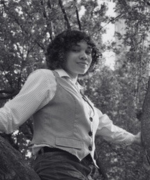By D. R. Wormack
CW: Mentions of blood, gore.
This it is. Belly up. The colors. Stunning.
The sun glitters across the skin creating a sparkle where the body meets the water. Bright orange—a real orange, not neon traffic cone orange—and white. A few dark patches might be black spots or might be mud, hard to tell from this distance.
The only reason you saw it in the first place, only reason you noticed the color, was the noise coming from the green pond, thick with algae so bright it dulls a field of clover. First, you thought it was the filter billowing from the pond’s center. A large bubbling circle diffuses outward from where the pump empties. In waves, the circle hits the mossy wall around it. But no. The noise came from beside the filter.
The log of orange and white—maybe with black spots or mud—rolls over. It sends ripples through the nearby water fast enough to belch. And, to smell.
The smell of death. Of an animal thrown on the fire pile, waiting to burn in the summer heat. Even worse, the smell of fish. It circles the pond in a gust, following the blur of orange and white.
The park starts to feel odd, as though the pungent gas in the air came from another world. A loud, bleating echo comes from the nearby woods. The sunlight turns colds. A chill crawls over your skin. Darkness climbs down the high trees. It fills the clearing you sit in.
Insects crawl and surround you. Little ants mostly. Black beaded bodies chain linked together in a six-eight march. They move with a hurried rhythm. Da-da-da, da-da-da. Over and over, but a few of them. Some of the ants have wings.
You stare at those ones in particular. They crawl toward your book—some fantasy collection, the story you are on is a little dry—you flick them away. After sending the fifth or sixth ant flying off the picnic table, one looks up at you.
Tiny eyes—smaller, more oval black beads than the black body—bug out of its head. Fierce eyes. Staring at you, through you. As it cranes its neck, a gap appears between its head and something else. A little crown, the same shade as its body, floats over the winged ant’s head. Royalty. It sends a regiment across the table. Toward you. Toward your book.
You leave the antsy wooden picnic table for a stone bench near the pond. The smell is stronger here.
Bile bloats your stomach. Silence settles. It breaks when a bird jumps out of the grass. The proportions are wrong. The grass is too high. The bird is too short. The bird makes eye contact.
You try to read your book, but a man passes you. Distracts you. A hooded sweatshirt hides most of him. He throws a rock in the pond. The splash sends a dragonfly past your head. You flinch. Another splash. He stands behind a clump of tall grasses, hood up; the pond hides him. He lobs more rocks. One. By. One. Into the pond.
Your eyes follow the sound. The boulders leave large holes in the algae’s surface revealing nearly black water underneath. He keeps throwing. The rocks start to build a ring in the pond, a ring around the orange and white thing.
You think it might be a fish.
He stops before the rock count gets too high. A relief, maybe he will leave the poor, unmoving fish alone. But he comes back.
You force your eyes down. This man’s moment is intimate and unsettling. Not meant to have a witness like you.
Something rattles like a bell in the bushes at your back. The subtle racket makes the man’s head turn. He stops throwing rocks, says something under his breath. He leaves. The pond quiets.
The weather starts to turn back. The sun blazes down. It gives you a reading light, and it makes the stench around the pond grow thicker.
You finish the book. The wind blows it shut. You walk around the far side of the pond, closer to the strange fish in the water.
Flora spreads over the pond’s surface. Speckled, egg-like lumps rest on tiny islands of plant matter. Green stems shoot up from each island, blending with the algae. Death invades your nose.
It sits about four or five feet from shore. It is a fish. A koi fish. A dead koi fish with a tear along its stomach. White and orange guts spill into tar water. Its yellow eye dark. You lean toward it. Holding the long stems of almost black, purple flowers for balance, you step down.
And slide.
And tear stems.
And stumble.
And fall. Under the wave of algae.
Sunlight disappears. A weight tugs downward. Pitch black water slides down your throat. You scream, without sound. Tar invades your lungs. Invisible chains hold you in place.
Algae repairs the hole on the surface. Movement, muffled by the water, bounces around in the darkness. A ripping pain hits you from sternum to pelvis. A balloon of red. The chains let go. The current from the pump pushes you. Spinning, spreading the red all the way to the surface. This it is. Belly up. The colors are stunning.
The sun glitters across your skin creating a sparkle where your body meets the water. Bright orange—a real orange, not neon traffic cone orange—and white. A few dark patches might be flies or might be blood, hard to tell from this distance.

D. R. Wormack is a creative based out of Pittsburgh who likes to experiment with genre. Her work has been published in Oakland Arts Review and Cherry Bomb Literary Magazine. In 2024, she was awarded the Monty Culver Award for Fiction at the University of Pittsburgh. https://www.drwormack.com/
